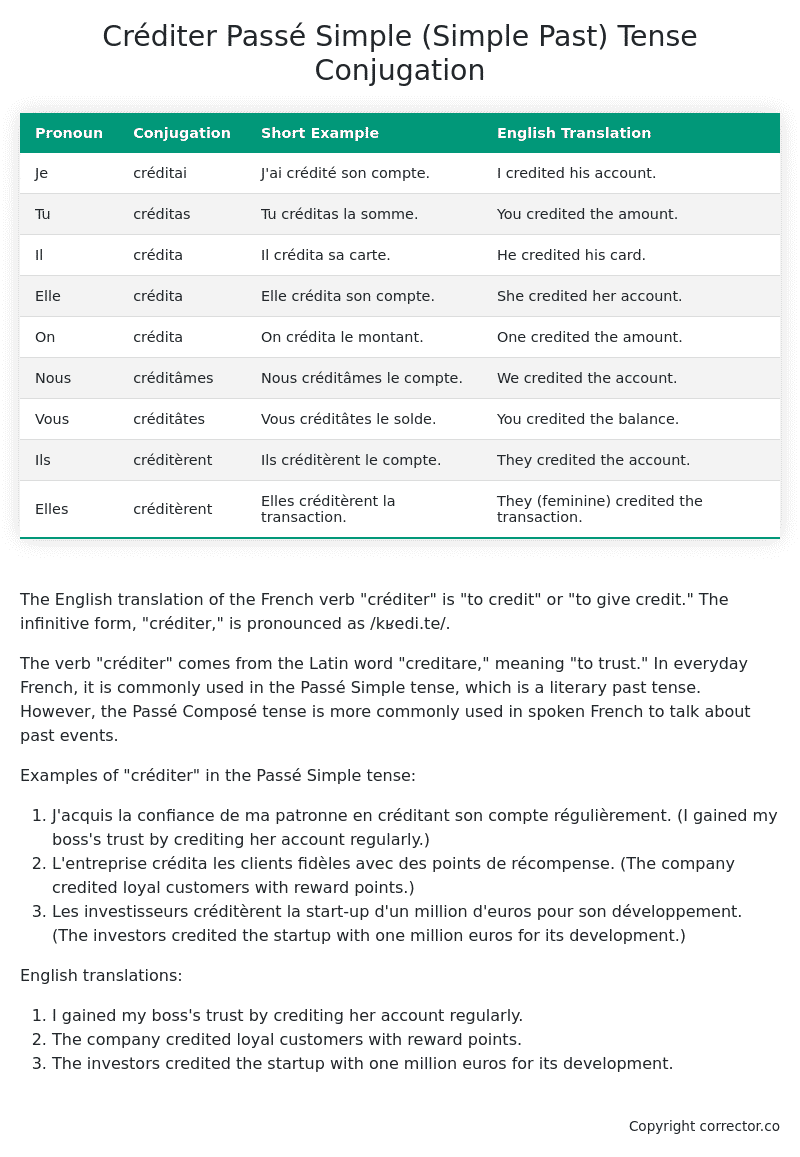Passé Simple (Simple Past) Tense Conjugation of the French Verb créditer
Introduction to the verb créditer
The English translation of the French verb “créditer” is “to credit” or “to give credit.” The infinitive form, “créditer,” is pronounced as /kʁedi.te/.
The verb “créditer” comes from the Latin word “creditare,” meaning “to trust.” In everyday French, it is commonly used in the Passé Simple tense, which is a literary past tense. However, the Passé Composé tense is more commonly used in spoken French to talk about past events.
Examples of “créditer” in the Passé Simple tense:
- J’acquis la confiance de ma patronne en créditant son compte régulièrement. (I gained my boss’s trust by crediting her account regularly.)
- L’entreprise crédita les clients fidèles avec des points de récompense. (The company credited loyal customers with reward points.)
- Les investisseurs créditèrent la start-up d’un million d’euros pour son développement. (The investors credited the startup with one million euros for its development.)
English translations:
- I gained my boss’s trust by crediting her account regularly.
- The company credited loyal customers with reward points.
- The investors credited the startup with one million euros for its development.
Table of the Passé Simple (Simple Past) Tense Conjugation of créditer
| Pronoun | Conjugation | Short Example | English Translation |
|---|---|---|---|
| Je | créditai | J’ai crédité son compte. | I credited his account. |
| Tu | créditas | Tu créditas la somme. | You credited the amount. |
| Il | crédita | Il crédita sa carte. | He credited his card. |
| Elle | crédita | Elle crédita son compte. | She credited her account. |
| On | crédita | On crédita le montant. | One credited the amount. |
| Nous | créditâmes | Nous créditâmes le compte. | We credited the account. |
| Vous | créditâtes | Vous créditâtes le solde. | You credited the balance. |
| Ils | créditèrent | Ils créditèrent le compte. | They credited the account. |
| Elles | créditèrent | Elles créditèrent la transaction. | They (feminine) credited the transaction. |
Other Conjugations for Créditer.
Le Present (Present Tense) Conjugation of the French Verb créditer
Imparfait (Imperfect) Tense Conjugation of the French Verb créditer
Passé Simple (Simple Past) Tense Conjugation of the French Verb créditer (You’re reading it right now!)
Passé Composé (Present Perfect) Tense Conjugation of the French Verb créditer
Futur Simple (Simple Future) Tense Conjugation of the French Verb créditer
Futur Proche (Near Future) Tense Conjugation of the French Verb créditer
Plus-que-parfait (Pluperfect) Tense Conjugation of the French Verb créditer
Passé Antérieur (Past Anterior) Tense Conjugation of the French Verb créditer
Futur Antérieur (Future Anterior) Tense Conjugation of the French Verb créditer
Subjonctif Présent (Subjunctive Present) Tense Conjugation of the French Verb créditer
Subjonctif Passé (Subjunctive Past) Tense Conjugation of the French Verb créditer
Subjonctif Imparfait (Subjunctive Imperfect) Tense Conjugation of the French Verb créditer
Subjonctif Plus-que-parfait (Subjunctive Pluperfect) Tense Conjugation of the French Verb créditer
Conditionnel Présent (Conditional Present) Tense Conjugation of the French Verb créditer
Conditionnel Passé (Conditional Past) Tense Conjugation of the French Verb créditer
Conditionnel Passé II (Conditional Past II) Tense Conjugation of the French Verb créditer
L’impératif Présent (Imperative Present) Tense Conjugation of the French Verb créditer
L’impératif Passé (Imperative Past) Tense Conjugation of the French Verb créditer
L’infinitif Présent (Infinitive Present) Tense Conjugation of the French Verb créditer
L’infinitif Passé (Infinitive Past) Tense Conjugation of the French Verb créditer
Le Participe Présent (Present Participle) Tense Conjugation of the French Verb créditer
Le Participe Passé (Past Participle) Tense Conjugation of the French Verb créditer
Struggling with French verbs or the language in general? Why not use our free French Grammar Checker – no registration required!
Get a FREE Download Study Sheet of this Conjugation 🔥
Simply right click the image below, click “save image” and get your free reference for the créditer Passé Simple tense conjugation!

Créditer – About the French Passé Simple (Simple Past) Tense
Formation
Usage
Narration
Historical Context
Interactions with other tenses
Passé Composé
Imparfait
Conditional and Subjunctive
Summary
I hope you enjoyed this article on the verb créditer. Still in a learning mood? Check out another TOTALLY random French verb conjugation!


